Annual Report for 2012
Eastern District of Michigan
Annual Report for 2012

Enforcement, Prevention, Community Trust
At the U.S. Attorney’s Office for the Eastern District of Michigan, our mission is to improve the quality of life for our citizens. We seek to prioritize cases and lead initiatives that will have a meaningful impact on our region. As U.S. Attorney General Eric Holder has stated, federal prosecutors should see themselves not as just case processors, but as community problem solvers.
Despite budget cuts from Congress and staff reductions caused by the continuing Department of Justice hiring freeze, the lawyers and support professionals in our Detroit, Flint, and Bay City offices, along with our partner agencies, made significant accomplishments in 2012. Among them:
Umar Farouk Abdulmutallab was sentenced to life in prison for attempting to blow up Northwest Flight 253 over Detroit on Christmas Day 2009 for Al-Qaeda.
Former Detroit Water Director Victor Mercado pleaded guilty to conspiracy as the trial of former Detroit Mayor Kwame Kilpatrick and associates on public corruption charges began in September and continued into 2013.
Our office collected nearly $500 million in fines, forfeiture, restitution, and judgments, up from $111 million last year, and more than 20 times our entire office budget of $24 million. These funds are being returned to victims and taxpayers.
Our lawyers and support professionals dedicated our efforts to the three pillars of our work -- enforcement, prevention, and community trust. Our enforcement efforts continued to focus on our priority areas: terrorism, violent crime, public corruption, financial fraud, and civil rights. These are the areas that we have identified as the most important to the Eastern District of Michigan, based on our continuing dialog with community stakeholders and law enforcement leaders. Homicide rates remain intolerably high, and, although we cannot generally prosecute homicide cases federally, we are focusing on cases involving illegal guns, violent crime, and drug trafficking, which contribute greatly to the homicide problem.
Equally important to enforcement is prevention. Our office led a number of efforts designed to prevent crime, which improves public safety without the social, personal, and monetary costs of arrest and incarceration. We continue to look for prevention strategies that have worked elsewhere. For example, we are participating in violence reduction strategies in Detroit and Flint based on the Ceasefire model, which has been successful in Boston and Chicago.
We continued our efforts to build community trust in law enforcement, so that we can be more effective in serving our citizens. When citizens feel empowered to work with police and report when they are victims or witnesses to crime, they become a force multiplier for improving public safety. We led and participated in community events throughout the Eastern District of Michigan to break down barriers and engage our citizens to work together.
Finally, we continued to seek ways to improve our internal processes, so that we can be more effective in our work and better serve our citizens in these times of scarce resources.
Here are some of the highlights for 2012.

The Theodore Levin U.S. Courthouse in Detroit.
ENFORCEMENT
National Security
Terrorism remained the top priority of the Department of Justice, and our National Security Unit focused on investigations relating to border security, international and domestic terrorism, terrorism financing, export violations, threats, hoaxes, trade secrets, and other violations of law that affect our national security. We continued to coordinate the multi-agency Anti-Terrorism Advisory Council and our own Critical Incident Response Team, so that we may be best prepared to prevent and respond to acts of terrorism.
International Terrorism. In February, Umar Farouk Abdulmutallab was sentenced to life in prison. He had pleaded guilty to all eight counts in an indictment, including charges of conspiring with Al-Qaeda to bomb a plane over U.S. soil, and attempting to murder 289 victims on board Northwest Flight 253 from Amsterdam to Detroit on Christmas Day 2009. The case demonstrated the effectiveness of civilian courts in terrorism cases, and provided a significant legal ruling, admitting evidence of defendant’s confession obtained by FBI agents without Miranda warnings under the law’s public safety exception. U.S. Attorney General Eric Holder recognized our trial team by presenting them with an Attorney General's Award at a ceremony in Washington, D.C., in October.
Trade Secrets. Theft of trade secrets harms our nation's competitive advantage with foreign manufacturers. In United States v. Qin, a former engineer for General Motors and her husband were convicted at trial of stealing 16,000 GM computer files, including trade secret documents pertaining to hybrid vehicle technology, and attempting to sell the technology to a Chinese competitor. General Motors estimated that the value of the stolen documents was more than $40 million. We hope prosecutions like this one will deter others from stealing technology from Michigan businesses.
We also organized a conference to raise awareness about protecting Michigan's technology. Speakers from the public and private sectors, including the U.S. Deputy Attorney General, James Cole, discussed strategies with Michigan businesses for protecting trade secrets, preventing cyber intrusions, and detecting counterfeit automobile and defense parts.
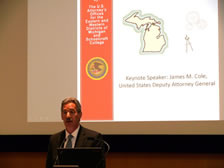
Deputy Attorney General James Cole addresses industry representatives at the Protecting Michigan's Technology conference at Schoolcraft College in Livonia.
Border Security. We worked with our law enforcement partners in Canada to improve communication and cooperation in joint investigations, so that our investigations along the border may become more seamless.
Cyber Security. We began working with the FBI to prioritize national security cyber crime, developing a protocol to review cases relating to this growing threat.
Violent Crime
Reducing violent crime is essential to the success of our region. Our citizens should feel safe in our neighborhoods, our homes, our schools, and our places of business, but crime and homicide rates remain intolerably high. With budget cuts throughout our state resulting in fewer law enforcement officers and prosecutors, we have increased our caseloads on the federal side, where penalties are often greater than in the state system. Lawyers and support staff in our Violent and Organized Crime Unit, our Drug Task Force, our General Crimes Unit, and our branch offices in Flint and Bay City all worked to reduce violent crime to improve public safety.
Initiatives
Human Trafficking Law Enforcement Working Group: We launched a new working group to share leads and coordinate training for law enforcement to better recognize the signs of human trafficking victims, who are often hiding in plain sight.
CVRP: We continued to partner with federal, state, and local law enforcement agencies in the Comprehensive Violence Reduction Partnership, using information-sharing and data-driven strategies to address firearms offenses and violent crime in Detroit.
Flint Zero Tolerance: To combat violent crime in Flint in light of limited local resources, our Flint branch office continued to prosecute every felon-in-possession of a firearm case that is eligible for federal prosecution. In 2012, we charged 94 felon-in-possession cases in Flint.
Indian Country: We continued to focus on violent crime occurring on the Saginaw Chippewa Indian Reservation in Mt. Pleasant.
Cases
Our efforts to target the most violent offenders who are harming our public safety resulted in a number of case successes. We charged more than 200 defendants with firearms offenses. Some of the more significant cases included the following:
Gang Activity. We used traditional organized crime statutes, such as the Racketeer Influenced and Corrupt Organizations Act (RICO) to attack violent street gangs, one of the greatest threats to public safety in Detroit, Pontiac, and Flint. In one case, 41 members and associates of the Devil's Diciples Motorcycle Club were charged with racketeering, drug trafficking, illegal firearms violations, obstruction of justice, and other federal offenses. The indictment alleged that the group used intimidation and violence to silence its adversaries and to maintain control of its members. In United States v. Brewton, 12 members and associates of the Howard Boys street gang were charged with racketeering, murder, distribution of narcotics, and firearms violations. The group draws its name from an apartment complex in Flint that served as its base of operations. In United States v. Gaskin, eight members of a criminal street gang in Detroit known as the Hustle Boys were convicted on charges of trafficking illegal narcotics from Michigan to West Virginia while armed.
In United States v. Oribello, a member of the Insane Spanish Cobras street gang was sentenced to seven years in prison for his role in trafficking firearms, heroin, and cocaine. Oribello transported drugs to Alpena and brought payment in the form of cash and firearms back to Detroit.
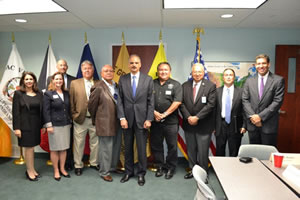
U.S. Attorney General Eric Holder meets with tribal leaders in Michigan.
Murder. In United States v. Bennett, a 20-year-old Mt. Pleasant man was charged with murdering a four-year-old child on the Saginaw Chippewa Indian Reservation. Defendant is charged with killing the child as part of a pattern of child abuse.
Murder-For-Hire. In United States v. Sierra-Rodriguez, six defendants were convicted at trial or through guilty plea and sentenced for their roles in a murder-for-hire plot and cocaine conspiracy. Defendants in Pontiac devised a scheme that resulted in the shooting and killing of the victim at his home in Littleton, Colorado, over a drug debt. The most culpable defendants were sentenced to 40 years and life in prison, respectively.
Carjacking. In United States v. Washington, a Detroit man was sentenced to 60 years in prison for committing three separate carjackings. In one of the carjackings, the defendant shot and injured a victim in Detroit. In another, the defendant threatened to kill the victim and her five-year-old child in Eastpointe. The third carjacking victimized a husband and wife and their 14-year-old son in Dearborn.
Armed Robbery. We used the Hobbs Act and other federal statutes to charge defendants with committing armed robberies. In United States v. Williams, a Detroit man was sentenced to 25 years in prison for armed robbery of a Radio Shack store and armed drug trafficking. In United States v. Coleman, a Detroit man was sentenced to 10 years in prison for committing an armed robbery of a CVS drugstore in Redford. In United States v. Simpson, two Detroit men were sentenced to 14 years and 10 years in prison, respectively, for their roles in a Sterling Heights armored car robbery. The defendants forced the driver out of his truck at gunpoint and stole $300,000. In United States v. Mitchell, three Saginaw men were convicted of conspiring to commit armed bank robbery and possessing firearms in furtherance of crimes of violence for their roles in robbing five banks in Saginaw and Shiawassee counties.

Drug Task Force Chief Dawn Ison and Violent and Organized Crime Chief John O'Brien plan violence reduction strategies.
Arson. In United States v. Darwich, a Beverly Hills, Michigan, man was convicted of 33 counts in an arson-for-profit scheme. Darwich and his co-defendants bought houses and businesses, burned them down, and then submitted false insurance claims totaling $5 million. Darwich faces a mandatory minimum sentence of 130 years.
Drug Trafficking. We focused our drug enforcement efforts on dismantling large-scale drug trafficking organizations and prosecuting individuals using guns and violence in the drug trade. In United States v. Sharp, 19 defendants were charged in a superseding indictment with distributing multi-kilo quantities of cocaine in the metro-Detroit area. Shipments of cocaine originated from the Sinaloa Cartel in Mexico and were transported across the country in cars and recreational vehicles to Wyandotte, where the drugs were offloaded for distribution. In United States v. Powell, 12 defendants were indicted for trafficking in cocaine, heroin, and marijuana, and laundering more than $21 million in drug proceeds. The indictment alleges that the defendants transported narcotics from Mexico across the United States in semi-trucks and distributed them in the metro-Detroit area. In United States v. Gordon, 15 defendants were charged with trafficking in powder and crack cocaine and more than 1,000 kilograms of marijuana in metro-Detroit. Some of the defendants were also charged with illegally possessing firearms after felony convictions. As part of the investigation, $500,000 was seized from a home in Franklin. In United States v. Valdovino, 10 defendants were charged in a superseding indictment with conspiracy to transport $150 million in heroin and cocaine from Mexico and distribute the drugs in Pontiac. In United States v. Bevington, 28 defendants were charged for their roles in manufacturing and distributing methamphetamine in Sanilac and St. Clair counties. In United States v. Smith, 13 members of a drug trafficking conspiracy were convicted in Flint, and the two leaders of the criminal organization were sentenced to 25 years and life in prison, respectively, for drug and gun offenses. In United States v. Marshall, 25 members of a drug conspiracy were convicted of trafficking heroin and cocaine in Bay City. In United States v. Bost, a Detroit man was sentenced to more than 17 years in prison for armed drug trafficking at a housing project in Detroit. On appeal, in United States v. Lyons, we obtained an order from the Sixth Circuit Court of Appeals reversing the district court’s order that suppressed evidence seized after a traffic stop. The court of appeals held that reasonable suspicion permitted officers to stop the car to search for evidence of drug trafficking. The officers found more than $11,000 in cash.
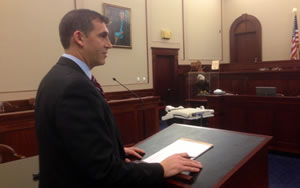
Assistant U.S. Attorney Matt Roth leads the office's Project Safe Childhood program.
Child Exploitation. Prosecutors in our Project Safe Childhood Program convicted a number of defendants for sexually exploit children. In United States v. Asakevich, a 36-year-old man from Three Rivers, Michigan, was sentenced to life in prison for attempting to entice a minor to engage in unlawful sexual activity and distributing child pornography. The defendant engaged in an online chat with an individual he believed to be a 14-year-old girl who was in fact an undercover police officer. He sent her messages and child pornography and arranged to meet her for sex. In United States v. Wooten, a defendant was convicted at trial for manufacturing and distributing over the Internet images of a three-year-old girl engaged in sex acts with the defendant. In United States v. Austin, a middle school teacher in Fraser was charged with producing, receiving, and possessing child pornography when pornographic photo and video images of students were found on his cell phone. In United States v. Ristich, a Saginaw man was convicted after using his cellular telephone to photograph his sexual exploitation of a 12-year-old girl. In United States v. Merrill, a Central Michigan University Professor was charged with receipt and possession of more than 5,000 images of child pornography. In United States v. Robinson, we obtained a decision by the Sixth Circuit Court of Appeals to reverse a district court decision to sentence a defendant to one day in prison for possessing more than 7,000 images of child pornography, including pictures of the torture and rape of children. The Court of Appeals instructed the district court to consider the seriousness of the offense and the need to deter others.
Forced Labor: In United States v. Toviave, an Ypsilanti man was convicted at trial of illegally bringing four minors to the United States from Togo, changing their names, disguising their ages, and falsely claiming that they were his own children. He beat them and forced them to work at his home as domestic servants. Alert school officials notified law enforcement about their concerns that the children were being abused.
Kidnapping. In United States v. Brown, defendants received sentences of 15, 13, and four years in prison, respectively, for their roles in kidnapping a Detroit woman. In an effort to extort repayment of a drug debt from an associate of the victim, the defendants duct taped the victim’s hands and feet, wrapped a belt around her neck, placed a leather bag over her head, and drove her from Detroit to Kentucky. The victim was stabbed in the thigh when she attempted to escape. Defendants released her upon payment of $800 in ransom.
Public Corruption
Attacking public corruption in federal, state, and local government remains a high priority. Our region cannot thrive until we have the honest government at every level that our citizens deserve.
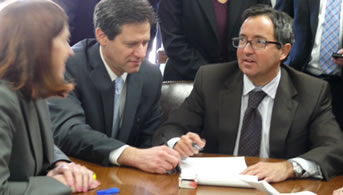
Assistant U.S. Attorneys Jennifer Blackwell, Mark Chutkow and Michael Bullotta, members of the trial team, discuss witness testimony in United States v. Kilpatrick.
City Officials. Victor Mercado, the former Director of the Detroit Water and Sewerage Department, pleaded guilty to conspiracy in awarding public contracts. He became the second defendant, along with Derrick Miller, convicted in the case that also charged former Detroit Mayor Kwame Kilpatrick, his father Bernard Kilpatrick, and contractor Bobby Ferguson with racketeering, extortion, and related offenses. The trial of the remaining defendants began in September and continued into 2013. In United States v. Beasley, the former Treasurer of the City of Detroit was indicted on charges of bribery for accepting cash and trips in exchange for approving more than $200 million in investments by Detroit's pension funds. Two investment managers for Detroit’s pension funds were also charged with paying bribes to the former Treasurer. In United States v. Seay, a Pontiac City Councilman and two associates were charged with bribery and drug offenses. Seay and his co-defendants were charged with accepting bribes in exchange for using Seay's position to help set up a business to launder drug proceeds.
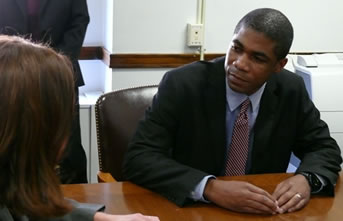
Assistant U.S. Attorneys Jennifer Blackwell and Eric Doeh, members of the trial team in U.S. v Kilpatrick, discuss trial strategy.
County Officials. Three defendants pleaded guilty in connection with an investigation of public corruption in Wayne County government. In United States v. Kazmi, the former Chief Information Officer for Wayne County pleaded guilty to accepting bribes from a private contractor in the form of cash and trips. In United States v. Edwards, Kazmi’s deputy also pleaded guilty to accepting bribes from a private contractor. In United States v. Allebban, Wayne County's Director of Enterprise Application was indicted for obstructing justice and falsifying documents to conceal Kazmi's bribery scheme. Kazmi was Allebban's supervisor. The indictment alleges that Allebban delivered $24,000 to a private contractor to induce the contractor to lie to the FBI about bribes the contractor paid to Kazmi. In United States v. Griffin, an Indiana businessman pleaded guilty to wire fraud for submitting inflated invoices to Wayne County Healthchoice, a corporation established to provide reasonably priced health care to qualifying individuals. In United States v. Grundy, a former Assistant Wayne County Executive was charged with taking kickbacks, wire fraud, and money laundering in connection with his work as the former Director of Wayne County Healthchoice.
School Officials. In United States v. Campbell, a Detroit Public Schools contract accountant and her daughter, a DPS teacher, were indicted for obtaining more than $500,000 in school funds by fraud. The defendants were charged with program fraud, money laundering, and tax offenses for submitting fraudulent invoices from a sham company for books and supplies that were never provided. In United States v. Davis, a Highland Park School Board member was charged with stealing $125,000 from the school district by submitting false invoices for advertising and educational programs. In United States v. Reid, a River Rouge school official was convicted at trial of bribery and mail fraud for accepting cash in exchange for preferential treatment for a company that provided tutoring services. The loss to the school district was $160,000. In United States v. Sledge, a former associate superintendent for Pontiac Public Schools pleaded guilty to converting $236,000 of school funds to his own use.
Housing Officials. In United States v. Doster, four defendants were charged with devising a scheme to defraud the U.S. Department of Housing and Urban Development. Two of the defendants were employees of the Michigan State Housing Development Authority, which awarded housing vouchers to homeless people. The defendants accepted cash in exchange for awarding vouchers to people who were not homeless, thereby diverting taxpayer funds intended for the needy.
Township Supervisor. In United States v. Morgan, the former Supervisor of Royal Oak Township was sentenced to three years in prison for bribery, fraud, and environmental violations. Morgan accepted a bribe from a contractor in exchange for a contract to remove asbestos from an abandoned theater. During the demolition process, Morgan caused the submission of a fraudulently inflated change order of $168,892.
Postal Supervisors. In United States v. Gorski, an Ann Arbor postal supervisor was sentenced to 18 months in prison for accepting bribes in exchange for steering maintenance work on postal vehicles to a private contractor. Four other postal employees were also convicted in the scheme, including the former manager of the Detroit maintenance center.
Financial Fraud
Our financial fraud investigations encompassed health care fraud, investor fraud, identity theft, mortgage fraud, environmental violations, and intellectual property offenses, among other crimes.
Health Care Fraud. Our criminal and civil attorneys worked closely together, along with the Justice Department's Medicare Fraud Strike Force, to attack health care fraud, charging doctors, pharmacists, and other health care providers with making fraudulent claims to the Medicare, Medicaid, and other insurance programs, and for diverting prescription drugs for illicit use. In United States v. Patel, six defendants including five pharmacists were convicted at trial for their role in a $37 million drug distribution and health care fraud scheme. Defendants billed Medicare, Medicaid, and private insurers for drugs that were never provided or were medically unnecessary. Patients would receive Oxycodone, Vicodin, and Xanax as kickbacks in exchange for their personal insurance information. The lead defendant owned or controlled more than 20 pharmacies in metro-Detroit. In United States v. Sharma, four individuals were charged in a $23 million scheme to defraud Medicare by submitting fraudulent claims for home health care and psychotherapy services. The defendants subjected patients in adult day care to unnecessary psychotherapy sessions. In United States v. Shah, owners of a home health care company were charged with submitting $8.8 million in fraudulent billings to Medicare for services that were not provided of were medically unnecessary and paying cash kickbacks to patients in exchange for their personal Medicare information. In United States v. Agbebiyi, a physician was sentenced to five years in prison for committing $5 million in Medicare fraud by subjecting patients to unnecessary and potentially dangerous neurological testing. In United States v. Briceno, one defendant was sentenced to five years and another to three years in prison for using three clinics in Livonia to perform medically unnecessary diagnostic testing and to fraudulently bill Medicare for $5.4 million.
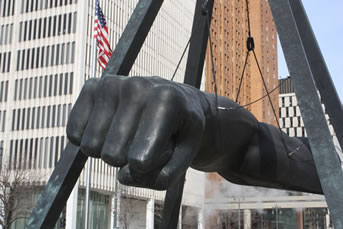
The Fist of Joe Louis symbolizes Detroit's resilience.
On appeal, the Sixth Circuit Court of Appeals affirmed the conviction of a defendant who operated a sham medical clinic and billed Medicare for expensive medication for people who never received any treatment in United States v. DeOleo. The Court of Appeals found that the government properly offered evidence that the defendant had also run sham clinics in Florida, cheating Medicare in the same way.
In the civil arena, we joined forces with the Justice Department to reach a $7.9 million settlement with the Walgreens pharmacy chain to resolve claims that it violated the False Claims Act when it offered illegal inducements in the form of gift cards to beneficiaries of government health programs, such as Medicare, to transfer their prescriptions to Walgreens. We also reached a $6 settlement with the owners of a Troy laboratory and an associated billing firm in Tennessee to resolve claims that they violated the False Claims Act by billing Medicare $900 per patient for testing that doctors had not ordered. And we reached a $3 million settlement with 14 physicians or physician groups and a radiology testing company to resolve allegations that the company paid kickbacks to the physicians for patient referrals under the guise that the payments were for test supervision or rent.
Investor Fraud. In United States v. McKnight, a Swartz Creek man was convicted for orchestrating a $72 million Ponzi-style fraud scheme. He offered investments over the Internet, promising a return of 15 percent per month. In fact, in classic Ponzi scheme fashion, funds were used to pay off early investors to make the investments appear successful. In United States v. Winans, a Maryland man pleaded guilty to committing an $8 million Ponzi scheme. The defendant sold interests in Saudi Arabian crude oil bonds that did not exist, obtaining investment funds from more than 1,000 victims. In United States v. Brito, five individuals were charged with conspiracy to commit wire fraud for operating a Ponzi scheme. Defendants solicited investments on its website GetMoni.com by making false statements about the likelihood of success of investments in gold and silver mines. In United States v. Alabadi, a Dearborn man pleaded guilty to committing a $2 million Ponzi scheme. He sold investments to support rebuilding efforts in Iraq and to fulfill contracts with the United Nations. Money was instead used to repay early investors to make the investments appear successful.

The U.S. Attorney's Office for the Eastern District of Michigan has branch offices in Bay City and Flint. The Flint branch operates out of the Flint courthouse, above.
Identity Theft. In United States v. Dixon, eight individuals were indicted for conspiracy to commit identify theft and related charges. Defendants were charged with obtaining personal identification information of more than 100 individuals and then using that information to submit online claims for $400,000 in unemployment compensation benefits.
Mortgage fraud. Our office filed a number of mortgage fraud cases, bringing criminal charges and civil claims. Mortgage fraud not only harms the lender but also harms communities because foreclosures lead to vacant homes that lower property values and become havens for criminal activity. In United States v. Duke, defendants used straw purchasers and false documents to obtain loans on 180 properties in metro-Detroit. The defendants allowed the loans to default and go into foreclosure. Losses exceeded $100 million. In United States v. Abdullah, an Inkster woman was sentenced to eight years in prison for her role as leader of an organization that engaged in mortgage fraud, arson, drug trafficking and money laundering.
Environmental Offenses. Environmental enforcement is vitally important to our district. Clean air and water are among Michigan’s most valuable assets, and their protection is essential to our state’s future. We used criminal and civil actions to enforce environmental protection laws. In United States v. Waite, a Bay City man was sentenced to 12 months in prison for violating the Clean Air Act by directing workers to remove asbestos from a Utica auto plant without using proper abatement methods, polluting the air to save time and money. In United States v. Raby, a trained emissions officer working in River Rouge was convicted for making false statements under the Clean Air Act. The defendant pleaded guilty to filing false reports to conceal his poor work attendance. The defendant falsified data concerning test results intended to measure the air contaminants emitted in manufacturing steel. In United States v. Glover, a recycling business in Canton and its owner pleaded guilty to using counterfeit labels on cathode ray tube monitors that were exported to Egypt. The labels were intended to conceal the age of the monitors. The business, DCI, also pleaded guilty to improperly storing hazardous waste.
In the civil arena, in United States v. Marathon Ashland Petroleum, we obtained a consent decree to resolve allegations that the defendant violated the Clean Air Act by allowing hazardous air pollutants to be released from several refineries, including one in Detroit. A monitoring and control scheme was implemented to to limit harmful emissions and ensure compliance with the law. In United States v. Michigan Sugar, we brought a joint motion with the defendant to mark the successful completion of a consent decree that required a Bay City sugar processing facility to monitor emissions and comply with the Clean Air Act. The consent decree resulted in diminished emissions of carbon monoxide and other pollutants.
in United States and State of Michigan v. City of Detroit, the United States and the State of Michigan continued to ensure that discharges from the Detroit wastewater treatment plant complied with the law so that significant improvement in the area’s water resources could continue. In In re Sweid Oil, our office obtained an access warrant from the U.S. District Court to permit the Environmental Protection Agency to inspect and clean up several contaminated sites in Bay County. We also obtained authorization to send pre-suit notices to certain Detroit-area scrap dealers after EPA investigators found violations of the Clean Air Act arising from the processing of scrap appliances and scrap metal. The notices seek compliance with the law, civil penalties, and improvement in industry practices.
Intellectual Property. In United States v. Ayoub, two defendants were charged with trafficking in counterfeit airbags. Their alleged conduct not only infringed upon the trademarks of the manufacturer, but also posed a safety risk to the public when counterfeit airbags were used in the replacement market. In United States v. Aoun, defendants were convicted of fraud and money laundering for their conduct in importing counterfeit consumer goods, such as shoes, clothing, and handbags, and selling them in metro-Detroit area retail stores.
Mail Fraud. In United States v. Wilson, a Yale, Michigan, man was convicted in a $2.6 million fraud scheme targeting friends and family members of prisoners incarcerated across the United States. The defendant sent mailings to prisoners, falsely offering legal services to overturn convictions and reduce sentences, but, in fact, never provided any services. The victims lost money and were denied the legal services they sought.
Program Fraud. In United States v. Moore, the founder and former executive director of the non-profit domestic violence organization Looking for My Sister pleaded guilty to federal program fraud for misappropriating funds the organization received through federal grants. Moore admitted to using grant funds to purchase goods and services for her personal use and the use of her family.
Tax Evasion. In United States v. Sharrak, a Farmington Hills man was sentenced to six years in prison for income tax evasion. He was also ordered to pay the IRS $4.2 million in back taxes, interest, and penalties. The defendant earned millions of dollars by running adult websites, spamming millions of email addresses, and consulting for adult entertainment dance clubs in Toledo and Dayton, Ohio. In United States v. Balcwicz, a Lapeer man was convicted at trial of income tax evasion. The defendant earned more than $569,000 in income as an electrician over several years, but filed false W-4 forms, claiming that he was exempt from income tax withholdings.
Civil Rights
Our Civil Rights Unit, formed in 2010, continued its robust enforcement efforts in 2012. Civil rights are essential to maintaining a high quality of life in a multi-cultural community like ours. Making all people feel welcome and protected is essential to the population growth necessary to the economic future of Michigan.
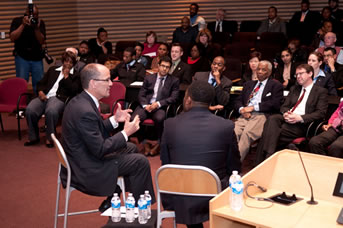
Thomas Perez, Assistant Attorney General for Civil Rights, speaks at the U.S. Attorney's Forum on Civil Rights at the Damon J.Keith Center at Wayne State University.
Hate Crimes. In United States v. Avery, a Detroit man pleaded guilty to assaulting another man at a convenience store because of the victim's sexual orientation. The victim suffered a fractured eye socket and other injuries. In United States v. Morgan, a Detroit man was sentenced to three months in prison, 200 hours of community service, and a $1,000 fine after pleading guilty to mailing a noose and threatening photographs to an inter-racial couple. The photos depicted lynched black men and the murdered body of Nicole Brown Simpson. The letter stated that inter-racial couples would share the same fate.
Voting Rights. We reached a settlement with the City of Flint to provide wheelchair access to polling places in time for the November elections. The City also agreed to make all future polling places accessible as required by the Americans with Disabilities Act.
Disabilities Rights. Along with the Civil Rights Division, we obtained a settlement with the Henry Ford Health System to ensure effective communication with individuals who are deaf or hard of hearing in the provision of medical services. The agreement resolved a complaint filed under the Americans with Disabilities Act alleging that the Henry Ford Health System failed to provide sign language interpreters to a deaf patient at one of its in-patient psychiatric facilities and to his family members who are also deaf and needed interpreters to communicate effectively with health care providers.
Police Practices. We continued to work with the City of Detroit to reach full compliance with the consent decree between the Department of Justice and the Detroit Police Department, increasing compliance to 89 percent. Achieving benchmarks in training, warning systems, and equipment, such as in-car cameras, will make Detroit a model police agency.
Protecting Service Members. We settled a complaint brought under the Uniformed Services Employment and Reemployment Rights Act against a local municipality for failing to properly reemploy a firefighter and U.S. Army reservist when he returned from military service in Afghanistan in support of Operation Enduring Freedom. As a result of our case, the service member received the job he had earned, along with $25,000 in back pay and other compensation.
Other Civil Cases
Our office is also responsible for representing the United States in court in civil matters. Among our Civil Defensive Litigation successes in 2011:
Employment Discrimination. In Sandhu v. Napolitano, the district court granted summary judgment for the United States in an employment discrimination action. The government established that the plaintiff was fired from his job with U.S. Customs and Border Protection because of unprofessional conduct at an airport and lack of candor with his supervisor, not, as the plaintiff alleged, because of age, race and national origin discrimination. The decision was affirmed by the U.S. Court of Appeals for the Sixth Circuit.
Bivens. In Burley v. Gagacki, the United States prevailed in a Bivens action arising out of the execution of search warrants at a home in Detroit during a narcotics investigation. Plaintiffs claimed that federal task force officers used excessive force in violation of their constitutional rights. After hearing the evidence at trial, the court granted the government's motion for a directed verdict.
Immigration. In Mehanna v. U.S. Citizenship and Immigration Services, the government successfully defended the authority of the Secretary of Homeland Security to revoke a visa petition. The district court granted the government’s motion to dismiss the plaintiff’s complaint for lack of jurisdiction. On appeal, the U.S. Court of Appeals for the Sixth Circuit affirmed.
Torts. In Bazzo v. United States, the government prevailed in a medical malpractice case involving a federally funded health center. The U.S. Court of Appeals for the Sixth Circuit affirmed the decision.

Civil Rights Chief Judy Levy, Affirmative Litigation Chief Peter Caplan and Civil Division Chief Elizabeth Larin Discuss Enforcement priorities.
PREVENTION
In addition to our enforcement efforts, we continued to work on preventing crime. We believe that an effective way to reduce crime is to prevent it from occurring in the first place. History has shown that we cannot simply arrest our way out of our crime problems, and that long-term reductions in crime require efforts to attack the root causes of crime.
National Forum on Youth Violence Prevention. We continued to work with the Department of Justice to facilitate the City of Detroit’s plan to reduce youth violence. The plan resulted from a series of listening sessions with youth, educators, faith leaders, law enforcement officials, public health officials, business leaders, and non-profit agencies. Piloting in the areas near Cody High School on the City’s west side and Osborn and Denby High Schools on the east side, the program seeks to reduce youth violence by employing strategies that have proven effective in other parts of the country. The Detroit plan includes a program called Safe Passages, an alternative to expulsion which provides consequences for inappropriate behavior while allowing students to continue their education. The plan also includes an initiative called Safe Routes, in which volunteer patrols watch out for students as the travel to and from school. Another part of the plan, known as Ceasefire, seeks to reduce homicides. By analyzing data provided by police and community members, Ceasefire identifies potential trigger pullers, calls them in to communicate the community’s expectation of non-violence, and provides them with opportunities to obtain services to help avoid violence. Individuals who are identified through Ceasefire for assistance and then commit acts of violence are held accountable through arrest and prosecution.
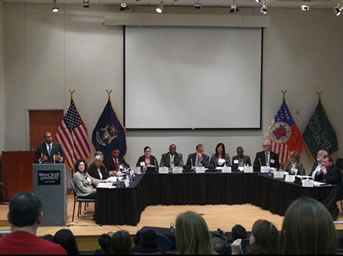
Associate Attorney General Tony West address Chairman Joe Torre and the Attorney General's Defending Childhood Task Force at Wayne State University.
Flint Lifelines. We are supporting the City of Flint in its efforts to provide a program modeled after Ceasefire. At-risk community members are called in to meet with law-abiding members of the community and offered “lifelines” through opportunities to obtain services to help avoid crime and violence.
Face-To-Face. This ongoing program focuses on improving the likelihood of success for citizens re-entering the community after serving sentences in prison. Recidivism rates show that two-thirds of all prisoners will commit new crimes, so we have targeted this population for prevention outreach. We called in citizens who were returning from prison to raise their awareness of the consequences of committing new offenses, such as stiff federal sentences and the absence of parole in the federal system. We also provided them with information about services that are available to help them succeed, from job training and resume writing programs to tattoo removal services. We held programs in Detroit, Flint, and Milan.
Explorers. High school students participate in a program at our office where they learn about careers in law and law enforcement, culminating in a mock trial at the federal courthouse before a U.S. District Court Judge.
Project Sentry. Our prosecutors visited dozens of schools to talk to students about the consequences of gun violence, from physical harm to prison sentences.
Project Safe Childhood. Our prosecutors spoke to student and parent groups about Internet safety, sharing stories from cases about Internet child predators and describing ways to safeguard privacy online. As part of our anti-violence strategy and civil rights enforcement, we participated in presentations at schools and community forums about the dangers of bullying and cyber-bullying and remedies that are available to victims.
Fraud. We participated in a seminar for seniors to raise awareness of fraud schemes, such as Ponzi investment schemes, identity theft, and mortgage fraud.

Faith leaders and law enforcement officials join forces to fight violent crime in Detroit.
COMMUNITY TRUST
We have worked with our law enforcement partners to improve public trust. We understand that law enforcement cannot be successful without the trust of the people we serve. We need citizens to speak up when they are victims of crime or witnesses to crime, and end the “no-snitch” culture. To achieve that kind of open communication, we need to work to earn community trust. To break down barriers between law enforcement and community members, we conducted outreach events throughout the district.
In light of these goals, we conducted outreach events in schools and civic groups throughout the district, in urban centers, on the Saginaw Chippewa Indian Reservation, in Muslim and Arab populations, in Hispanic communities, with veterans and military service members, Jewish groups, Native Americans, the disabled, seniors, immigrant groups, and in the LGBT community. We continued to participate in ALPACT (Advocates and Leaders for Police and Community Trust) in southeast Michigan, and worked with the Michigan Department of Civil Rights to launch new chapters of ALPACT in Flint and Saginaw. We seek to include all groups in our outreach efforts, and will endeavor to reach additional groups in 2013.
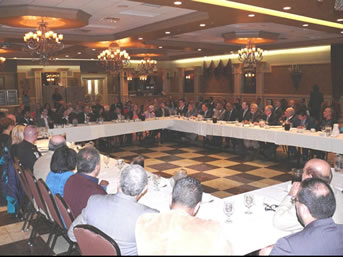
Arab and Muslim community members meet with law enforcement representatives at a meeting of BRIDGES (Building Respect to Enhance Sensitivity) in Dearborn.
We continued to work with the U.S. District Court to improve the diversity of jury pools, providing input into selection plans and participating in a public forum in Detroit to raise public awareness of the importance of jury diversity and jury service. The public has more confidence in jury verdicts when the juries reflect the diversity of our region.
We also continued our efforts to improve the diversity of our own office. We have developed and executed a plan for hiring, training, and retaining personnel from various backgrounds, including minority and majority populations. Our office is more effective and credible when we include people with different perspectives.
We sought to maintain transparency in our work whenever possible. Of course, some of our work is protected from disclosure because of grand jury secrecy rules and privacy laws, but when we can, we let the public know how we are spending our resources on behalf of our citizens.
IMPROVING OUR WORK
We continued to look for ways to improve our own work through management practices, training, coordination of efforts, and communication, despite budget cuts and a hiring freeze that led to reductions in our legal and support staffs. Our Administrative Division implemented a number of new initiatives to utilize technology to improve efficiencies. Among our accomplishments this year:
Training Our Lawyers. We trained our new lawyers in law, ethics, and practice with weekly "boot camp" seminars. We provided mandatory annual training for all of our prosecutors to ensure compliance with all legal obligations to provide discovery material to defendants.
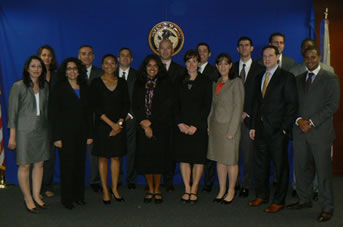
Our Hiring philosophy has been to hire outstanding lawyers from diverse backgrounds.
Training Agents. We conducted training programs for agents and law enforcement officers in terrorism trends and tactics, discovery, search warrants, and other topics to improve their awareness of legal issues.
Coordinating Civil and Criminal Cases. We coordinated the efforts of our civil and criminal attorneys to leverage resources, share information, and improve effectiveness in fraud cases.
Revising Policies. We reviewed and updated our internal policies for handling cases and managing our office. We updated our forms to promote uniformity and efficiency.
Utilizing Technology. We improved the way we utilize technology for communication, case organization, legal research, and administrative matters to reduce costs and improve efficiency.
These are a few of the ways we improved our internal operations during 2012. We constantly seek to improve the way we conduct our business, and will continue to strive to improve in 2013. We welcome your suggestions about how we can improve.

Detroit's skyline from Belle Isle.
SERVING OUR REGION
It is inspiring to witness the dedicated public servants who work in the U.S. Attorney’s Offices in Detroit, Flint, and Bay City. While some of our cases result in headlines, most are handled quietly by the professionals in these three offices. We are grateful for our partnership with law enforcement agents, who risk their lives to protect public safety. We are privileged to serve the citizens of the Eastern District of Michigan, and we work every day to improve the quality of life in our community.
Barbara L. McQuade
United States Attorney
Eastern District of Michigan


 U.S. Department
of Justice
U.S. Department
of Justice